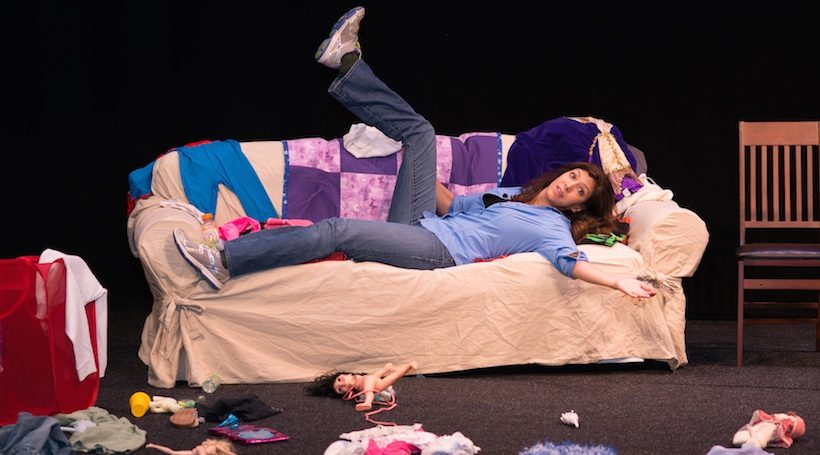As technology has shrunk our global world, a new phenomenon has grown: crowdfunding. Anyone with a new business idea or even a significant personal need can ask for help – online – and people around the world respond. And they respond by sending cash to someone they never met (and probably never will).
“You can literally start a fundraiser in a couple of minutes and reach a wide range of people quickly and easily,” says Jacob Russell, an assistant professor at Rutgers Law School and expert in financial regulation. People respond because “they like to feel they’re part of creating something. They love having one-of-a-kind access to something.”
Here in South Jersey, crowdfunding projects run the gamut. A quick search will return everything from families requesting help with medical expenses to entrepreneurs looking for start-up capital.

Dena Blizzard
Take Dena Blizzard, for example. Blizzard has been doing stand-up comedy for nearly 15 years, but in 2015 she took a leap of faith, bringing “One Funny Mother: I’m Not Crazy!!,” her one-woman show, to the New York International Fringe Festival. The show did well, and audiences appreciated Blizzard’s hilarious take on motherhood and the craziness that comes with raising kids in the suburbs. Investors were interested, but Blizzard quickly discovered that it takes money to make money.
“We had people who wanted to invest in the show to bring it back to New York, but that process is expensive,” she says. “It costs about $17,000 just to file all the initial paperwork and get the ball rolling. I thought, ‘I just don’t have that,’ and somebody said, ‘Have you thought about a Kickstarter?’ We gave ourselves 30 days to raise $10,000, and it started very slowly. I was like, ‘Gosh, is this gonna happen?’ On the very last day it all came through.”
In the end, backers raised a total of $10,685. Blizzard says creating the Kickstarter campaign was a bit of a nerve-wracking experience, because much of what she saw on the site was technology or invention-based and offered backers a tangible product in exchange for their support. She was simply offering to make them laugh. Blizzard says she was amazed that much of the funding came from complete strangers.
“There have been people in my life who’ve said to me, ‘If you ever need anything, let us know and we’ll help,’ and then when the time came they didn’t help,” Blizzard says. “Then, all of a sudden, there are people I’ve never met putting money up on Kickstarter. A large majority were people I’ve never met – who I may never meet – and that was really surprising and wonderful for me.”
In the months since her Kickstarter campaign, Blizzard has made a name for herself, performing two nights a week off-Broadway and creating parody parenting videos that have gone viral. She was also one of five on-air finalists in the contest search for Kelly Ripa’s new co-host on “LIVE! With Kelly.” None of it would have been possible without the Kickstarter funds, though she says in the end the money wasn’t the most important thing she got out of the campaign.
“I feel like having a passion – something you’re totally in love with and want to do – can sometimes be a very solitary feeling,” she says. “You hope that people will get it, but you’re not always sure. When people can see what you’re doing, and they get it enough to pull out their wallets and take a chance on something, it’s kind of a beautiful moment. That’s the genius of Kickstarter.”
Crowdfunding has grown in popularity as social media has made it easier for entrepreneurs to find that validation. On sites like Kickstarter, which was founded in 2009, a reported 12.3 million backers have given more than $2.8 billion to various projects. Entrepreneur T.J. Eaton was one of the recipients of those dollars.

T.J. Eaton
The Tabernacle native grew up lifeguarding in Ocean City, constantly losing or breaking sunglasses. Five years ago, Eaton was inspired to create a sunglasses company that produced fashionable, affordable shades for millennials. When it took off, he realized he could introduce even more innovation to the industry. Along with his co-founder Rich Amundson, Eaton conceived a sunglasses subscription service. Shades Club delivers a new pair of glasses to subscribers every month, along with a protective cloth bag and a folding case. The idea was ambitious, and Eaton, 37, estimated he’d need $20,000 to get it off the ground.
“Initially we set the bar at what we thought it would take to launch the company and make this a reality,” Eaton says. “We said $20,000 would cover everything from website domain hosting to packaging. The campaign exceeded our expectations in a lot of ways.”
“Exceeded expectations” may be putting it lightly. Within the first 16 hours of his January 2016 Kickstarter campaign, backers had steamrolled the $20,000 goal. By the time the campaign’s 60 days were up, nearly 3,000 people had raised a collective $321,908.
“The Kickstarter really showed a proof of concept,” Eaton says. “It showed there was a customer demand for what we were doing, and if 3,000 are into this, that means there’s got to be a whole lot more people out there. Plus, that is a lot of people backing you, and that comes with a responsibility to go above and beyond and deliver.”
The more than $300,000 total made Shades Club the No.1-funded fashion sunglasses campaign in Kickstarter’s history, and the money allowed Eaton and his partner to fill every order and deliver on time – something not every Kickstarter project can do, regardless of funding. They’ve also been able to secure high-level advisors and devote more time to designing sunglasses and sourcing the best possible materials to manufacture them.
Eaton says the biggest benefit Kickstarter afforded him was the confidence to believe his idea could become a reality.
“I always say our goal wasn’t really a financial goal,” he says. “And this is something that’s important for anyone who has an idea or a business concept. It wasn’t so much about the money – yes, that’s what we needed to launch the business – but it was also about our vision and changing an industry.”
“I think prior to Kickstarter, there were so many ideas that didn’t have a platform to launch from,” Eaton continues. “Crowdfunding has provided a lot of benefit to a lot of people, both in terms of money and by virtue of being an incredible way for an entrepreneur to find validation.”
It’s also a psychological thing, too, Rutgers’ Russell says. People want to help projects, individuals or causes that others are already supporting – they want their own slice of the pie, so to speak, but they also want to help with the baking.
“Because of the way the platforms present themselves with things like success thermometers on the sidebars of webpages that show how much other people have given, people get that psychological benefit that they’re collaborating with others,” Russell says.
And it can also give people the feeling they’re lending a helping hand, he adds.
“On sites like GoFundMe, it’s the idea that you’re raising money for a very specific, personalized campaign, often for charity,” Russell says. “Even if there’s not a physical reward like there is with something like Kickstarter, you get that psychological reward of, ‘I’m giving to charity.’”
On GoFundMe, campaigns to fund medical treatment, education, life events and sports teams are prevalent. GoFundMe pages have had a big impact in recent years: after the 2013 Boston Marathon Bombing, more than
$2 million was raised for victims and their families, and this year a campaign for the victims of the Orlando nightclub shooting set a record on the site, raising nearly $8 million.
One GoFundMe page had a huge benefit for a local woman. In 2014, Gina Kramer just wanted her friend Becky Scott to focus on planning the wedding of her dreams. But in the spring of 2014, Scott, then in her mid-20s, was diagnosed with stage IV metastatic breast cancer.
“Her wedding was set for November 20, 2015, and early that year I decided I wanted to raise money for the wedding,” says Kramer, now 29. “She was dealing with chemotherapy and all these medical expenses, and she couldn’t focus on her wedding because she couldn’t afford it. I just wanted her to do something she could enjoy – like wedding planning.”
Kramer turned to GoFundMe with an initial request for $5,000. Money poured in from friends, family and strangers, but ultimately, there would be no wedding to pay for. Scott died a few weeks before the wedding date, and Kramer had to decide what to do with the more than $20,000 raised through GoFundMe.
Scott, an EMT, paramedic and volunteer firefighter from Tabernacle, had devoted her life to helping others. Kramer says it was important to her and to Scott’s family that the money would help make a difference to someone. They worked with Rowan College at Burlington County to establish a scholarship in Scott’s name. Last year, five incoming students received scholarships to attend the school’s Paramedic Sciences Program.
Kramer believes the GoFundMe effort raised such a significant amount because the community Scott impacted wanted to help her family in whatever way they could.
“I think a lot of it was the power of social media and the situation,” Kramer says.
“People want to help, and in this situation the most they can do is offer financial support, even if it’s just $5 or $10. It’s not even about the amounts people gave; when you take a step back and see how many people were connected to her story, that’s the big impact.”
Victoria Mier also contributed to this article.














